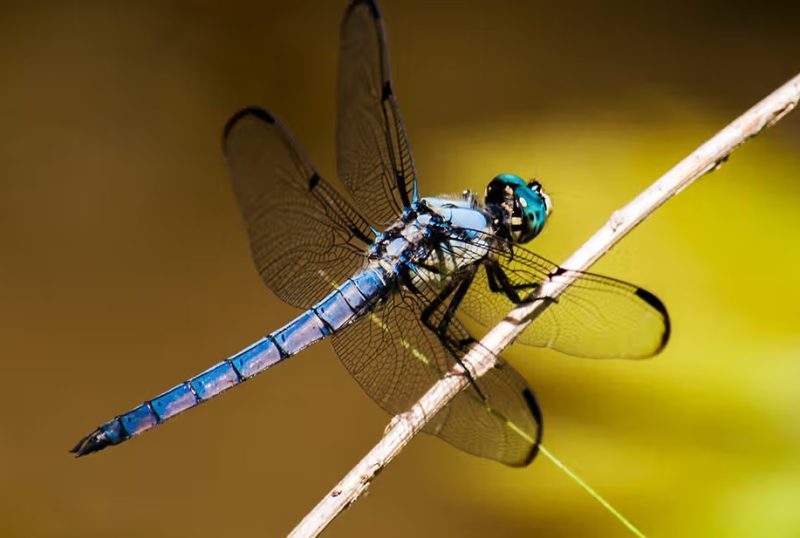Dragonflies are fascinating creatures that have roamed the Earth for millions of years. Their aerial acrobatics, iridescent wings, and hunting skills make them one of the most intriguing insects. However, many people wonder: Do dragonflies bite? This article will answer that question and uncover some surprising facts about these incredible insects.
Do Dragonflies Bite Humans?

The simple answer is no, dragonflies do not bite humans in a way that causes harm. While they do have strong mandibles for catching and consuming their prey, dragonflies are not aggressive toward humans. They may, however, bite if they feel threatened or are handled roughly.
Why Do Dragonflies Have Mandibles?
Dragonflies are carnivorous predators, meaning they need strong jaws to catch and eat their food. Their mandibles help them crush and consume their prey, which consists mainly of small insects like mosquitoes, flies, and gnats.
How Do Dragonflies Use Their Mandibles?
Dragonflies have a unique way of capturing their food. They use their legs to trap prey mid-air, then bring it to their mouth where their mandibles quickly go to work. Their jaws move in a powerful side-to-side motion, allowing them to crush their prey efficiently. Unlike chewing insects like grasshoppers, dragonflies rip apart their food before swallowing it.
Do Dragonfly Bites Hurt?
A dragonfly bite is usually harmless and painless to humans. While their mandibles are strong enough to crush other insects, they are not powerful enough to cause significant harm to human skin. If a dragonfly does bite, it may feel like a small pinch but will not break the skin or cause lasting pain.
When Might a Dragonfly Bite a Human?
Dragonflies generally do not bite unless they feel threatened or restrained. Situations where a dragonfly might bite include:
- Being handled too roughly – If you pick up a dragonfly and squeeze it, it may bite in self-defense.
- Feeling trapped – If a dragonfly is caught in clothing or netting, it may try to bite to free itself.
- Mistaking a finger for food – Although rare, a dragonfly may attempt to bite if it perceives movement similar to its prey. However, it will quickly realize the mistake and let go.
Can a Dragonfly Bite Break the Skin?
In rare cases, if a dragonfly bites a human, it might cause a slight pinch, but it usually does not break the skin. Unlike wasps or bees, dragonflies do not have venom or stingers, so their bite is not dangerous. The force of a dragonfly bite is relatively weak compared to other biting insects, and their mandibles are designed for crushing soft-bodied prey rather than piercing tough skin. Even larger species of dragonflies are unlikely to cause more than a minor, momentary discomfort if they do bite. If a dragonfly does happen to pinch you, there is no need for concern, as their bites do not transmit diseases or cause allergic reactions.
Can Dragonflies Bite Through Skin?
Dragonflies lack the ability to pierce human skin. Unlike mosquitoes or biting flies, they do not have specialized mouthparts for penetrating skin or drawing blood. Even the largest species of dragonflies have bites that are too weak to cause harm.
Understanding Dragonfly Behavior
To understand why dragonflies bite (or appear to bite), it’s important to look at their behavior and instincts.
Dragonflies Are Predators
Dragonflies are apex insect predators in their ecosystems. Their sharp mandibles allow them to catch prey mid-flight, making them highly efficient hunters. They do not bite out of aggression but rather as part of their natural feeding behavior.
Dragonflies May Bite When Handled
If you try to catch or hold a dragonfly, it might bite defensively. This is a reflex action rather than an attack. In most cases, the bite is harmless, and the dragonfly will release quickly once it feels safe.
Dragonflies Do Not Sting
A common myth is that dragonflies sting, but this is completely false. Unlike bees or wasps, dragonflies lack stingers and pose no real threat to humans.
Why You Shouldn’t Be Afraid of Dragonflies
Rather than fearing dragonflies, you should appreciate their benefits. These insects play a crucial role in controlling mosquito populations and maintaining ecological balance.
Dragonflies as Natural Pest Controllers
Dragonflies consume hundreds of mosquitoes per day, making them a natural and effective form of pest control. Their presence in gardens, wetlands, and near water bodies significantly reduces the population of biting insects. Unlike chemical pesticides, dragonflies offer an environmentally friendly solution for controlling pests without harming beneficial insects.
Harmless to Humans
Since dragonflies do not sting and their bites are not harmful, there is no reason to be afraid of them. They are naturally curious creatures and may fly close to humans, but they pose no danger. In fact, their presence should be welcomed, as they help keep ecosystems balanced by controlling pest populations.
Symbolism and Cultural Significance
In many cultures, dragonflies are seen as symbols of transformation, strength, and adaptability. They are often associated with positive traits such as resilience and the ability to navigate life’s changes with grace. Some Native American tribes view dragonflies as harbingers of good luck, while in Japanese culture, they represent courage and victory.
Surprising Facts About Dragonflies
Dragonflies are more than just beautiful insects. Here are some fascinating facts about them:
Dragonflies Are Ancient Creatures
Dragonflies have existed for over 300 million years. Their ancestors were much larger, with wingspans reaching up to 2.5 feet!
They Have Incredible Vision
Dragonflies have nearly 360-degree vision thanks to their compound eyes. Each eye contains thousands of lenses, allowing them to detect movement from great distances with exceptional accuracy.
Dragonflies Are Fast and Agile
With speeds of up to 35 miles per hour, dragonflies are among the fastest insects. They can hover, glide, and even fly backward, making them highly agile hunters.
They Spend Most of Their Life Underwater
Dragonflies start their life as nymphs in water, where they remain for several months to years before transforming into adults. As nymphs, they are also fierce predators, feeding on small aquatic creatures.
They Are Excellent Hunters
Dragonflies have an astounding 95% hunting success rate, making them one of the most efficient predators in the animal kingdom. Their ability to predict and intercept prey mid-flight ensures their high success rate.
What to Do If a Dragonfly Lands on You
If a dragonfly lands on you, stay calm and enjoy the moment. These insects are harmless and do not pose any threat to humans. Dragonflies are naturally curious creatures, and sometimes they rest on people simply because they see them as a stable surface.
Why Do Dragonflies Land on People?
- Resting – Dragonflies often take short breaks during flight, and your body might be a convenient spot.
- Attracted to Bright Colors – If you’re wearing bright or reflective clothing, a dragonfly might mistake you for a flower or water surface.
- Curiosity – Dragonflies have excellent vision and might be investigating their surroundings, including you!
What Should You Do?
- Remain Still – Sudden movements might startle the dragonfly, causing it to fly away.
- Observe and Appreciate – Many cultures see a dragonfly landing on you as a symbol of good luck, change, or spiritual transformation.
- Let It Fly Away Naturally – Dragonflies usually take off within a few seconds or minutes on their own. Avoid trying to swat or shake it off.
If a dragonfly chooses you as a temporary resting place, consider it a unique and lucky encounter with nature!
Conclusion
So, do dragonflies bite? Technically, they can, but only in self-defense, and their bite is harmless to humans. Dragonflies are beautiful, beneficial, and fascinating insects that help control pests and maintain ecological balance. Rather than fearing them, we should appreciate their role in nature.
Next time you see a dragonfly, take a moment to admire its beauty and agility—without worry!






